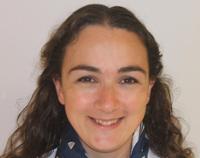 Every clinician has encountered patients whose memories stay with them for years. The patients who stick usually are not the ones for whom the clinician made a brilliant diagnosis or provided evidence-based therapies. They are the patients who touched clinicians' hearts, the ones they formed a relationship with, the ones in whom they saw themselves or a loved one—ultimately, the ones who taught them how to be better, more compassionate caregivers.
Every clinician has encountered patients whose memories stay with them for years. The patients who stick usually are not the ones for whom the clinician made a brilliant diagnosis or provided evidence-based therapies. They are the patients who touched clinicians' hearts, the ones they formed a relationship with, the ones in whom they saw themselves or a loved one—ultimately, the ones who taught them how to be better, more compassionate caregivers.
For radiation oncology resident Kendra Harris, one such patient was a woman she met during a rotation as a medical student. The woman had a form of amyotrophic lateral sclerosis (aka Lou Gehrig’s Disease) in which the neurodegenerative disease started by claiming her ability to speak and express emotion before it affected other motor functions. Not surprisingly, she had trouble communicating her needs or concerns about her treatment.
Kendra says she often thinks about this patient as she cares for others today. Although these patients can speak, when they get a cancer diagnosis, they are often blindsided by the news and don’t readily know what choices lie ahead. Kendra’s reflections land on an aspect of patient-centeredness: “It’s not just about answering their questions, it’s about helping them to understand what those questions are.”
Kendra’s story is part of our Heart of Caring podcast series, which invites patients and clinicians to share experiences that capture the essence of patient- and family--centered care. Please listen below and consider sharing your story.
and has turn into a billion dollar industry with currently three American television networks investing
a blended total of $20. The exclusive downside to this football helmet is that it can not soak up moisture very well.
They are members of the Eastern Division of the American Football
Conference (AFC), the National Football League (NFL).
Your article helped me a lot, is there any more related content? Thanks!
I don't think the title of your article matches the content lol. Just kidding, mainly because I had some doubts after reading the article.
Thanks for sharing. I read many of your blog posts, cool, your blog is very good. https://www.gate.io/pt-br/signup?ref_type=103&ref=XwNAUwgM
I appreciate the effort put into this post. Follow icc ranking in cricket — fixtures, live coverage, rankings, and tournament updates. Get match details, squads, tables, and quick access to highlights in HD.